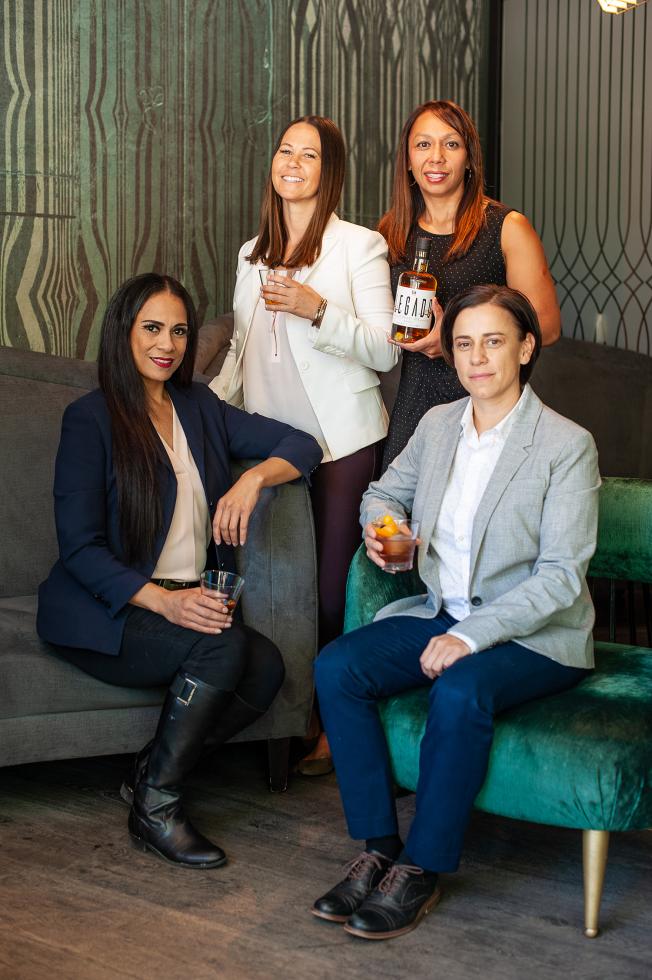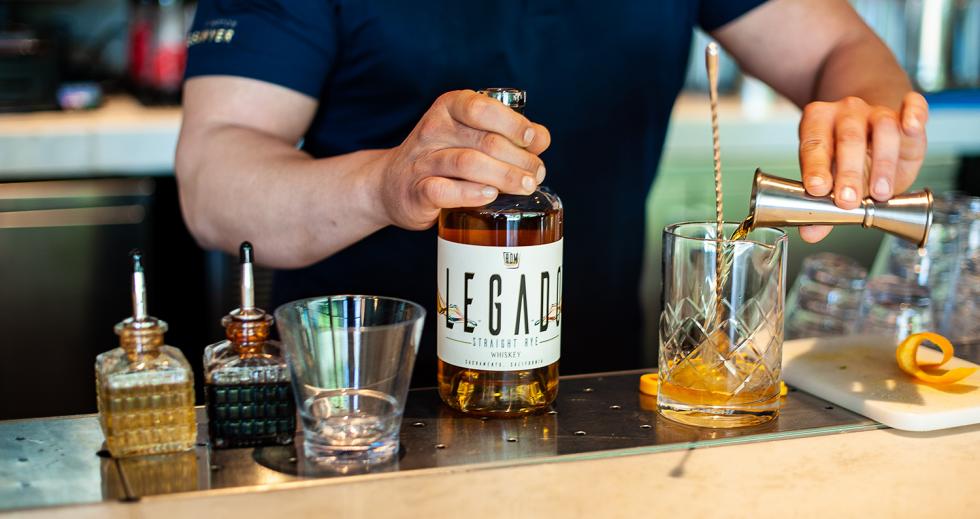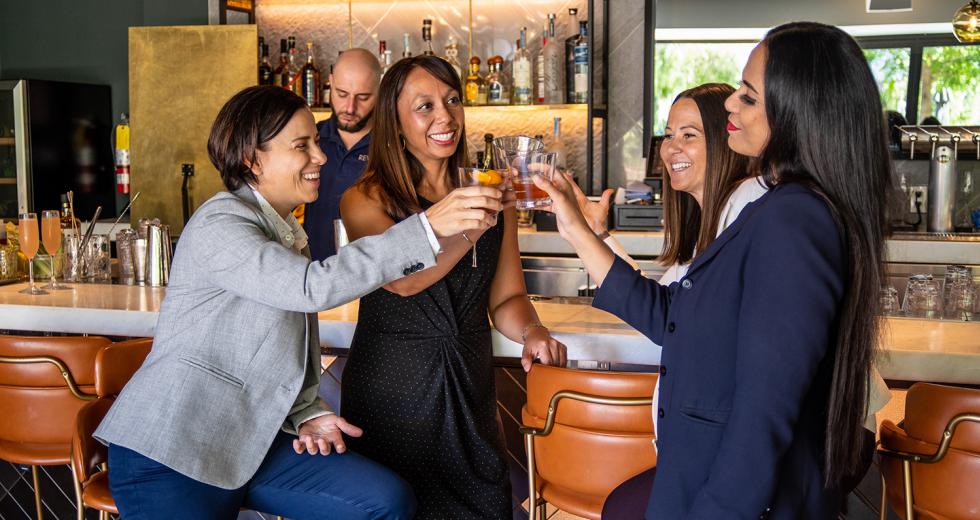Plenty of couples pick up hobbies to bond outside of work: birdwatching, say, or training for a marathon. Sacramento residents Yvette Rincon and Charmaine Magale — a city planner and a chiropractor — decided in 2016 to learn about whiskey production in their free time.
The result ended up more front and center than most side hustles: In September 2018, Rincon, Magale and co-owners Christy Decelle and Hola Motuapuaka launched Legado Whiskey, Sacramento’s first spirits company owned by women.
Though Legado Whiskey is a dark American rye, the company is as unaged as moonshine. The owners have yet to open a distillery, instead adding their own twists to whiskey imported from a distillery in Indiana. The owners have nevertheless leveraged their story — homegrown, women-owned — to reach consumers around the Capital Region, a key strategy in the crowded craft beverage market.
From left: Hola Motuapuaka, Christy Decelle, Charmaine Magale and
Yvette Rincon of Legado Whiskey, Sacramento’s first spirits
company owned by women.

The couple joined with Decelle, an entrepreneurial friend who owns three Beach Hut Deli locations, and the three women completed an apprenticeship at a whiskey distillery in Northern California. Decelle introduced them to their final and most seasoned partner, Motuapuaka, co-owner of Myla’Cor Wine & Spirits, based in Sacramento. “As soon as I heard their vision, I immediately said I’m all in,” says Motuapuaka, who launched Myla’Cor in 2012, an experience she describes as “kind of like having a blindfold on and swinging at a piñata with a stick.”
In contrast, the Legado launch was “really precise,” Motuapuaka says. She made sure the brand had a social media presence long before they poured their first bottle, so that their followers would spread the news of their events. She focused their messaging on the women-owned angle. She rattles off some sample messages: “It’s whiskey with a woman’s perspective, their experience, their tastes, their palate. Strong enough for men, but made by women.”
While the owners initially hoped to add to this cred by starting the first distillery in the city of Sacramento, regulatory hurdles and high costs waylaid their plans. “They don’t really know what to do with us,” Magale says. “We’re practically defined as an oil refinery that’s going to blow the block up.”
Sounds hyperbolic, but it’s true. The California Fire Code regulates refineries and distilleries under the same terms, because they both produce combustible liquids. To qualify for a building permit, the Legado owners would have to install expensive safety appliances like spill-catch systems and automatic drop-down doors in addition to distilling equipment. It’s the high price of these safety features, compounded with rising rents in Sacramento, that have prevented distilleries from opening closer to the urban core, says Greg Baughman, who owns Gold River Distillery in Rancho Cordova.
Those costs involve some bureaucratic Catch-22s: A distiller can’t start selling spirits until it holds a federal permit, state permit, formula approval and label approval, but it can’t apply for permits until it has a location and equipment for the auditors to inspect. The process can take up to a year and a half. “And that whole time,” says Baughman, “you’re just paying rent and not doing anything.” Gold River and its Rancho Cordova neighbor, J.J. Pfister, are the only operating distilleries in Sacramento County, while a few more dot the outer (and lower-rent) reaches of the metro area — Amador & Dry Diggings Distillery in El Dorado Hills and California Distilled Spirits in Auburn. “Rancho was an easy city to deal with,” says Baughman, explaining his choice of location.
Revival bartender Ronnie Kaldani pours a drink with Legado
Whiskey.

Recently, state legislators have slightly eased regulations for craft distillers. In 2018, former Gov. Jerry Brown signed legislation nicknamed The Craft Distillers Opportunity Act, which bumps maximum production for craft distilleries to 150,000 gallons per year and scratches rules that barred distilleries without tasting rooms from selling their bottles onsite. Though the new law has no effect on rents or the permit process, Magale is hopeful.
“Gov. Brown said he was hoping to open things up for craft distilleries, so it may get easier over time,” she says. Gov. Gavin Newsom has not made any public statements regarding distilleries, but he may have a soft spot for the spirits industry; his multimillion-dollar fortune grew out of a wine and spirits shop he opened in San Francisco in 1992.
For now, Legado sources rye whiskey at barrel proof — a fiery 60 percent alcohol by volume — and finishes it at Loch & Union, a distillery in Napa Valley that makes its own malt whiskey and bottles outside brands. Loch & Union adds water to the whiskey to bring it to a palatable strength and pours it into Legado’s signature sleek bottles, which come from a glass manufacturer in Fairfield.
“We want to inspire others to create their own legacy, to do whatever they feel passionate about.” Yvette Rincon, co-owner, Legado Whiskey
Legado is available in about 40 locations, including Raley’s, Select Wine and Spirits and Taylor’s Market, and Motuapuaka is pushing to enter markets in Nevada and the Bay Area, as well in Asia and the Middle East. The owners have run demos in Hong Kong, Taiwan and the Philippines, and their whiskey will be for sale at the World Expo 2020 in Dubai this October, she says.
Even as they gain a following in faraway markets, the owners of Legado have not lost their hometown loyalty. Since their launch, they have run tasting events at locations such as the Mix Downtown and de Vere’s Irish Pub and gained coveted shelf space at a dozen bars and restaurants in the Sacramento area. “Our goal is to become a staple in our hometown,” Motuapuaka says.
The Legado owners also intend to follow through on their goal to distill their whiskey in Sacramento using locally grown ingredients. They’re learning as much as they can from local distillers, including Baughman, who gave the Legado team a tour of his distillery in June. Though Baughman is wary of the difficulties that might face a distillery in the city of Sacramento, he didn’t discourage the owners from taking that route. “I recommended that they go with whatever is comfortable for them,” he says.
In the meantime, the four owners are keeping their day jobs while building the Legado brand.
“This is still a passion project,” says Magale, who feels equally passionate about her chiropractic office and has no plans to step away from it. “We want to send a message to other people that you can find the time to do what you want.”
—
Get this and other stories delivered to your inbox weekly: Sign up for our free email newsletter by clicking or tapping here.



